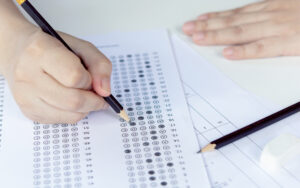Admissions decisions don’t come out for another few months, and the long wait to learn your fate weighs heavily on many high school students. In some ways this is the hardest part of the admissions cycle, since there is no longer anything you can do to impact your chances of admissions. Of course, for a lucky few, this wait is far shorter.
This is due to likely letters, a system by which elite colleges let some students know early that they are being considered for acceptance. But why do colleges send these letters? Who gets one? Should you expect one, and is it a bad sign if you don’t get one? In this article, we’ll explore the answers to all of these questions, and discuss what you should do if you receive a likely letter. Let’s jump in!
What Exactly is a Likely Letter from a College?
So, what is a likely letter? A number of top colleges send out letters to their top applicants in January and February, letting them know that their acceptance to the school is likely forthcoming (thus the term “likely letters”). These letters are sent to top academic and athletic recruits, with only a few such letters being sent out by each school every year.
These letters let you know that you will probably receive a letter of admission from the university come late March or early April, and that you should begin doing more research on the school, and networking with the incoming class page. Some of them will also connect you with a current student for a conversation, where they can answer any questions you may have.
Note that these letters are not binding, and while they usually mean that an offer of admission is forthcoming, it is not guaranteed. These letters also make clear that your acceptance is predicated on your continued academic and extracurricular performance, though this is true of all offers of admission. While it is a great sign to get a likely letter, it does not absolve you from continuing the excellent performance that brought the letter to you in the first place.
These letters are only sent out after the regular decision round of applications. They are not used in the early round, or for ED or ED II admissions (since those decisions come out at around the same time as likely letters).
Not all schools send likely letters; here is a list of top schools which do:
- Brown
- Columbia
- Cornell
- Dartmouth
- Duke
- Harvard
- Princeton
- Stanford
- UChicago
- UPenn
- Yale
Why Schools Send Likely Letters
Likely letters are used by colleges as a recruitment tool to attract top-level applicants. These are students who would bring something to the school, academically or athletically, that they want to secure. The use of these letters is meant to sway a student’s final decision, and convince them to attend the college in question.
Colleges hope that by sending out these letters, they will influence your final decision on where to attend college. They are giving you an extra few months to think about yourself on their campus, and explore what you might do at their institution. When admissions do come out, they believe that this will give them an extra edge in inducing you to attend their school, since you will have already been picturing yourself on campus, and grown accustomed to the idea.
Admissions officers expect these students to receive offers of admission to many of the colleges they apply to, and want to increase the chances of these students attending their school.
Should You Expect a Likely Letter
No. These are very rare letters, and even the best students rarely get one. It is not a slight against you to not receive them, and their appearance is the exception, rather than the rule.
Not receiving one of these letters doesn’t mean you did something wrong, or that your application was subpar. Generally schools only send likely letters to students in the following categories:
- Athletes, for schools which do not officially recruit athletes. DIII schools and the Ivy League notably do not have athletic recruiting in the same way DI schools do. They use likely letters as a way to let athletes know that they have interest in them, and to affirm their commitment to the program.
- Students who meet a particular need for a school. What this is varies each admissions cycle and between each school, but is usually for students with high level performance in an extracurricular, or who fulfill a demographic need for the school, such as students from low socioeconomic status backgrounds.
You’ll note that this is a very limited number of students. We work with hundreds of highly qualified and talented students each admissions cycle, and each year see only two to three likely letters. While this is anecdotal evidence, it does illustrate the general rarity of these letters.
What to do if You Receive a Likely Letter
While no response is needed, we do recommend taking advantage of the resources offered in the letter. While you likely put a good deal of thought into building your college list, taking time to do research now will enable you to envision yourself at a school. We recommend speaking with a student if you are connected, and asking any questions you may have about life on campus. Here are some sample questions we have found useful in the past:
- What’s it like living in student housing?
- How’s the food?
- What’s the workload like?
- What do people do on the weekends? On weeknights?
- How’s the weather? (This can matter a lot, especially for Texans who end up going North for college; I knew a girl from Austin who wore two pairs of pants all winter because she was so cold).
- What’s the area around the college like? Do you get off-campus often?
The goal of these questions isn’t to learn everything about the school, but to see if the school provides the kind of environment you want from a college. The more information you have when making a final decision, the better.
We recommend against committing to attend a school just because you got a likely letter. In the first place, a likely letter is not an offer of admission, merely an indication that you will probably be admitted. Second, and more importantly, you want to make your final decision with all of the information possible. You should wait until you know all of the schools which have admitted you, and compared their financial aid offers.
While a likely letter only reflects the opinions of one school, receiving a letter from one top school does indicate that you have the qualifications necessary to succeed in a top college. We find that our students who receive likely letters are often admitted to many of the schools they applied to.
Final Thoughts
Likely letters are not a major part of college admissions, and most students will never need to worry about or interact with them. That said, they can cause concern, especially if your friend gets one and you don’t. We recommend not comparing yourself to others in these scenarios; that only leads to unnecessary anxiety, and does nothing productive for you or anyone else.
College applications are already a very stressful time for many students, but likely letters do provide a brief respite for some. Another way to help manage stress is to get expert advice; if you want to hear how our expert mentors can make your college application journey easier, schedule a free consultation today. We have a depth of experience with every aspect of college admissions, and are always happy to hear from you.








